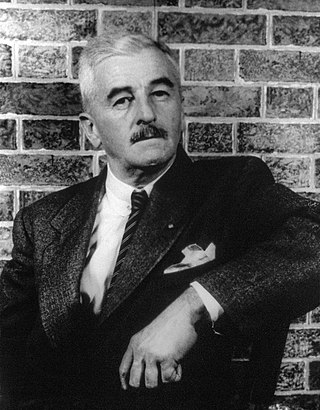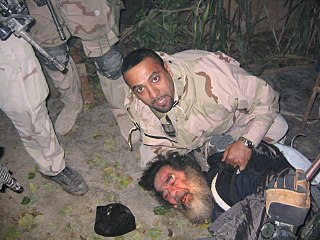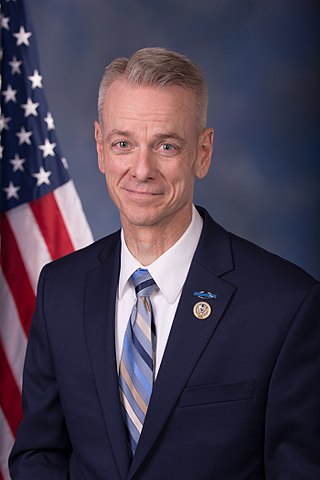
William Cuthbert Faulkner was an American writer. He is best known for his novels and short stories set in the fictional Yoknapatawpha County, Mississippi, a stand-in for Lafayette County where he spent most of his life. A Nobel laureate, Faulkner is one of the most celebrated writers of American literature and often is considered the greatest white writer of Southern literature.

Kings Row is a 1942 film starring Ann Sheridan, Robert Cummings, Ronald Reagan and Betty Field that tells a story of young people growing up in a small American town at the turn of the twentieth century. The picture was directed by Sam Wood. The film was adapted by Casey Robinson from a best-selling 1940 novel of the same name by Henry Bellamann. The musical score was composed by Erich Wolfgang Korngold, and the cinematographer was James Wong Howe. The supporting cast features Charles Coburn, Claude Rains, Judith Anderson and Maria Ouspenskaya.

The Big Red One is a 1980 American epic war film written and directed by Samuel Fuller, and starring Lee Marvin alongside an ensemble supporting cast, including Mark Hamill, Robert Carradine, Siegfried Rauch, Bobby Di Cicco, and Kelly Ward.

Three Kings is a 1999 American black comedy war film written and directed by David O. Russell from a story by John Ridley. It stars George Clooney, Mark Wahlberg, Ice Cube, and Spike Jonze as four American soldiers on a gold heist that takes place during the 1991 uprisings in Iraq against Saddam Hussein following the end of the First Gulf War.

Saddam Hussein, the deposed president of Iraq, was captured by the United States military in the town of Ad-Dawr, Iraq on 13 December 2003. Codenamed Operation Red Dawn, this military operation was named after the 1984 American film Red Dawn.

Control Room is a 2004 documentary film directed by Jehane Noujaim, about Al Jazeera and its relations with the US Central Command (CENTCOM), as well as the other news organizations that covered the 2003 invasion of Iraq.
The 2004 documentary film Fahrenheit 9/11 generated controversy before, during, and after its release a few months prior to the 2004 U.S. presidential election. The film, directed by Michael Moore, criticizes the Bush administration's attempt to pursue Osama bin Laden in the aftermath of the September 11 attacks, as well as the Iraq War. Although Fahrenheit 9/11 was generally praised by film critics and won various awards including that year's Palme d'Or, the content was criticized by several commentators for accuracy, and lack of context. Additionally, the distributors protested Moore's inaction on unauthorized copying.

The Mambo Kings is a 1992 musical drama film based on the 1989 Pulitzer Prize-winning novel The Mambo Kings Play Songs of Love by Oscar Hijuelos. The film was directed and produced by Arne Glimcher, and stars Armand Assante, Antonio Banderas, Cathy Moriarty and Maruschka Detmers. Set in the early 1950s, the story follows Cesar (Assante) and Nestor Castillo (Banderas), brothers and aspiring musicians who find success and stardom after fleeing from Havana, Cuba to New York City to escape danger. The film marks Glimcher's directing debut, and features Banderas in his first English-language role.

The Big Sleep is a 1946 American film noir directed by Howard Hawks. William Faulkner, Leigh Brackett and Jules Furthman co-wrote the screenplay, which adapts Raymond Chandler's 1939 novel. The film stars Humphrey Bogart as private detective Philip Marlowe and Lauren Bacall as Vivian Rutledge in a story that begins with blackmail and leads to multiple murders.
To Have and Have Not is a 1944 American romantic war adventure film directed by Howard Hawks, loosely based on Ernest Hemingway's 1937 novel of the same name. It stars Humphrey Bogart, Walter Brennan and Lauren Bacall; it also features Dolores Moran, Hoagy Carmichael, Sheldon Leonard, Dan Seymour, and Marcel Dalio. The plot, centered on the romance between a freelancing fisherman in Martinique and a beautiful American drifter, is complicated by the growing French resistance in Vichy France.

War Feels Like War is a 2004 British documentary film. Made for BBC Storyville and TV 2 (Denmark), it was broadcast in the United States as part of the P.O.V. series. The film "portrays journalists who covered the war in Iraq without the cover of helmets, bullet-proof vests, or the American military."

Eric David Manes is a feature film and television writer and producer, owner of Swiss chocolate company Coco Suisse with his wife Marianne Manes, and a State of California Registered Investment Advisor.

The Bush–Aznar memo is reportedly a documentation of a February 22, 2003 conversation in Crawford, Texas between US president George W. Bush, Prime Minister of Spain José María Aznar, National Security Advisor Condoleezza Rice, Daniel Fried, Alberto Carnero, and Javier Rupérez, the Spanish ambassador to the U.S. British Prime Minister Tony Blair and Italian Prime Minister Berlusconi participated by telephone. Rupérez transcribed the meeting's details which El País, a Madrid daily newspaper, published on September 26, 2007. The conversation focuses on the efforts of the US, UK, and Spain to get a second resolution passed by the United Nations Security Council. This "second resolution" would have followed Resolution 1441. Supporters of the resolution also referred to it as the "eighteenth resolution" in reference to the 17 UN resolutions that Iraq had failed to comply with.

Yellowstone Kelly is a 1959 American Western film based upon a novel by Heck Allen with a screenplay by Burt Kennedy starring Clint Walker as Luther Sage "Yellowstone" Kelly, and directed by Gordon Douglas. The film was originally supposed to be directed by John Ford with John Wayne in the Clint Walker role but Ford and Wayne opted to make The Horse Soldiers instead.

The interrogation of Saddam Hussein began shortly after his capture by U.S. forces in December 2003, while the deposed president of Iraq was held at the Camp Cropper detention facility at Baghdad International Airport. Beginning in February 2004, the interrogation program, codenamed Operation Desert Spider, was controlled by Federal Bureau of Investigation (FBI) agents. Standard FBI FD-302 forms filed at the time were declassified and released in 2009 under a U.S. Freedom of Information Act request filed by the National Security Archive. Saddam, identified as "High Value Detainee #1" in the documents, was the subject of 20 "formal interviews" followed by five "casual conversations." Questioning covered the span of Saddam's political career, from 2003 when he was found hiding in a "spider hole" on a farm near his home town of Tikrit, back to his role in a failed 1959 coup attempt in Iraq, after which he had taken refuge in the very same place, one report noted.

"How Does It Feel" is song by the British rock band Slade, released in 1975 as the second single from the band's first soundtrack album and fifth studio album Slade in Flame, in promotion of the film of the same name. The song was written by lead vocalist Noddy Holder and bassist Jim Lea, and produced by Chas Chandler. It reached No. 15 in the UK, remaining in the charts for seven weeks.

Voices of Iraq is a 2004 documentary film about Iraq, created by distributing cameras to the subjects of a film, thus enabling subjects to film themselves. To preserve its innovative filmmaking, Voices of Iraq was added to the permanent collection of Motion Picture Academy of Arts and Sciences.

Steven Dane Russell is President and CEO of JAARS, Inc. He is a retired American soldier and former politician. He served in the United States House of Representatives for Oklahoma's 5th congressional district from 2015 to 2019, after serving in the Oklahoma Senate from 2009 to 2013. Russell is a member of the Republican Party.

They Shall Not Grow Old is a 2018 documentary film directed and produced by Peter Jackson. It was created using footage of the First World War held by the British Imperial War Museum (IWM), most of which was previously unseen, and all of which was over 100 years old by the time of the film's release. Much of the footage was colourised and restored using modern production techniques for its use in the film, and sound effects and voice acting were added to the silent footage. The film's narration was edited from interviews with British WWI veterans from the collections of the BBC and the IWM.

















